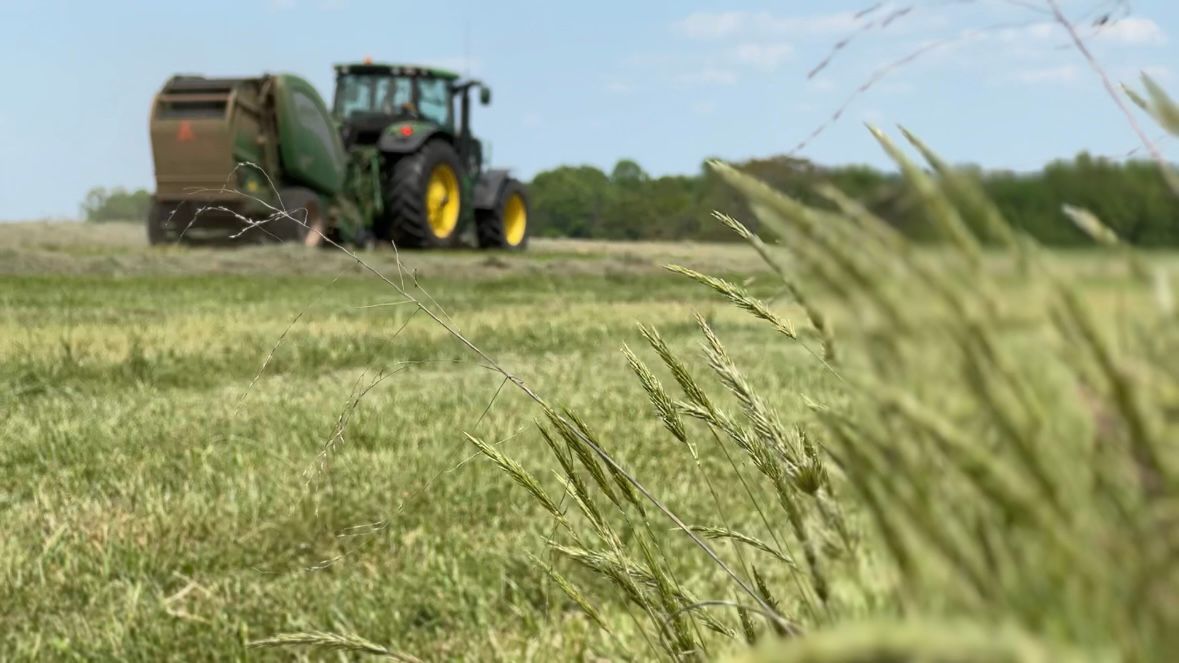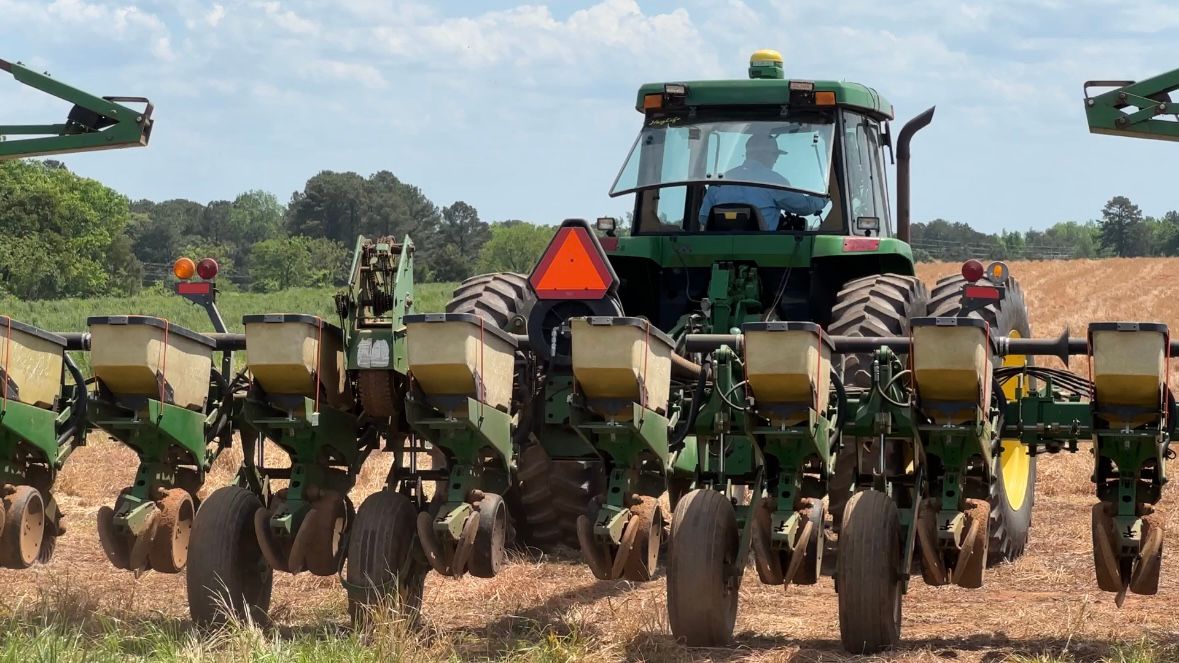North Carolina
Advances in agriculture and the modern farmer

RUTHERFORDTON, N.C. — As spring planting turns into summer growing season, farmers in North Carolina are once again placing their bets on their crops and hoping for a good year.
Stuart Beam of Beam Farms is primarily a forage farmer — producing crops like livestock feed, corn and hay. According the USDA’S 2022 agriculture overview, there are 45,000 farms in North Carolina. In 1920 there were six times that many at nearly 270,000.
Stuart Beam starts up one of his John Deere tractors. (Spectrum News 1/Rachel Boyd)
“Your farms built your community, especially in North Carolina, and when you lose your agriculture in the community, your community goes downhill,” Beam said.
Machines and manufacturers have made agriculture more efficient, making it barely recognizable from a hundred years ago. Modern agriculture looks like bigger operations with fewer individual farms.
“Our dependence on these machines has never been greater, the country’s dependence on us running these machines has never been greater and the importance for efficiency and ag has never been greater,” Beam said.
According to the USDA, in the 1800s 90% of the population lived on farms. Today farmers make up less than 2% of the population and have more people depending on them for their food supply than ever before.
“We’re business people. We’re not just a guy out here in overalls hoeing some cotton,” Beam said. “We do it because it’s in our blood. I think that I think that people are born with a purpose and at some point in their life, they realize what it is, and farmers tend to find out pretty quick.”

Stuart Beam running his planter on his farm. (Spectrum News 1/Rachel Boyd)
Beam says that although farming is a passion for most who choose to do it, at the end of the day it also has to be sustainable for them to remain in business. With the cost of the modern machinery that allows agriculture to function on its present scale the risks are greater for farmers who can’t afford a breakdown or malfunction that could jeopardize an entire crop.
“A light bulb can go out in that tractor and throw so many alarms that you have to shut down and change the light bulb before you can go on,” Beam said. “If that tractor goes down and the rest of his crop gets rained on, we’ve not lost $50 or $100 or a day’s paycheck. You know, he has lost thousands of dollars and that adds up in a hurry over the course of the year.”
He does everything he can to make his equipment last as long as possible, upgrading technology where applicable and keeping older models up and running, but he knows that’s not the way the industry is heading.
“The scale that ag has become, you don’t look at assets and equipment,” Beam said. “Because you’re going to get that machine, you’re going to lease it, you’re going to depreciate it quick. You’re going to run it for two years, and it’s going to be gone. You’re going to get another one.”
He said he’d be thrilled if the modern farmer could stand on his own two feet again without relying on million-dollar equipment to make a viable living.

North Carolina
NC Lottery Powerball, Lucky For Life results for Dec. 25, 2024
The NC Lottery offers several draw games for those aiming to win big. Here’s a look at Wednesday, Dec. 25, 2024 results for each game:
Winning Powerball numbers from Dec. 25 drawing
15-26-27-30-35, Powerball: 03, Power Play: 3
Check Powerball payouts and previous drawings here.
Winning Lucky For Life numbers from Dec. 25 drawing
04-10-35-42-45, Lucky Ball: 02
Check Lucky For Life payouts and previous drawings here.
Winning Pick 3 numbers from Dec. 25 drawing
Day: 8-0-0, Fireball: 3
Evening: 7-3-2, Fireball: 2
Check Pick 3 payouts and previous drawings here.
Winning Pick 4 numbers from Dec. 25 drawing
Day: 9-0-3-0, Fireball: 7
Evening: 9-3-8-4, Fireball: 7
Check Pick 4 payouts and previous drawings here.
Winning Cash 5 numbers from Dec. 25 drawing
03-09-28-39-40
Check Cash 5 payouts and previous drawings here.
Winning Double Play numbers from Dec. 25 drawing
01-11-15-18-22
Feeling lucky? Explore the latest lottery news & results
Are you a winner? Here’s how to claim your lottery prize
All North Carolina Lottery retailers will redeem prizes up to $599.
For prizes over $599, winners can submit winning tickets through the mail or in person at North Carolina Lottery Offices. By mail, send a prize claim form, your signed lottery ticket, copies of a government-issued photo ID and social security card to: North Carolina Education Lottery, P.O. Box 41606, Raleigh, NC 27629. Prize claims less than $600 do not require copies of photo ID or a social security card.
To submit in person, sign the back of your ticket, fill out a prize claim form and deliver the form, along with your signed lottery ticket and government-issued photo ID and social security card to any of these locations:
- Asheville Regional Office & Claim Center: 16-G Regent Park Blvd., Asheville, NC 28806, 877-625-6886 press #1. Hours: 9 a.m. to 5 p.m. Monday through Friday. This office can cash prizes up to $99,999.
- Greensboro Regional Office & Claim Center: 20A Oak Branch Drive, Greensboro, NC 27407, 877-625-6886 press #2. Hours: 9 a.m. to 5 p.m. Monday through Friday. This office can cash prizes up to $99,999.
- Charlotte Regional Office & Claim Center: 5029-A West W. T. Harris Blvd., Charlotte, NC 28269-1861, 877-625-6886 press #3. Hours: 9 a.m. to 5 p.m. Monday through Friday. This office can cash prizes up to $99,999.
- NC Lottery Headquarters: Raleigh Claim Center & Regional Office, 2728 Capital Blvd., Suite 144, Raleigh, NC 27604, 877-625-6886 press #4. Hours: 9 a.m. to 5 p.m. Monday through Friday. This office can cash prizes of any amount.
- Greenville Regional Office & Claim Center: 2790 Dickinson Avenue, Suite A, Greenville, NC 27834, 877-625-6886 press #5. Hours: 9 a.m. to 5 p.m. Monday through Friday. This office can cash prizes up to $99,999.
- Wilmington Regional Office & Claim Center: 123 North Cardinal Drive Extension, Suite 140, Wilmington, NC 28405, 877-625-6886 press #6. Hours: 9 a.m. to 5 p.m. Monday through Friday. This office can cash prizes up to $99,999.
Check previous winning numbers and payouts at https://nclottery.com/.
When are the North Carolina Lottery drawings held?
- Powerball: 10:59 p.m. Monday, Wednesday, and Saturday.
- Mega Millions: 11 p.m. Tuesday and Friday.
- Lucky for Life: 10:38 p.m. daily.
- Pick 3, 4: 3:00 p.m. and 11:22 p.m. daily.
- Cash 5: 11:22 p.m. daily.
This results page was generated automatically using information from TinBu and a template written and reviewed by a Carolina Connect editor. You can send feedback using this form.
North Carolina
Santa Claus swaps reindeer for alpacas at farm in Waynesville

WAYNESVILLE, N.C. — At Winchester Creek Farm, Santa Claus traded in his traditional reindeer for alpacas during the farm’s Santa Tour on Monday.
The event offered visitors a unique opportunity to pose for photos with Santa and interact closely with the farm’s animals.
The farm also featured a large mailbox for children to send their letters to Santa. Luanna Baldwin, a mother from Canton, expressed her delight with the experience.
“This was a great outing to take the girls for some Christmas magic,” Baldwin said. “They’ve been asking to see Santa, write a letter specifically, so that was super fun.”
At Winchester Creek Farm, Santa Claus traded in his traditional reindeer for alpacas during the farm’s Santa Tour, which concluded on Monday, Dec. 23.
WLOS via CNN Newsource
In addition to the alpacas, the tour allowed guests to feed and pet various other farm animals. Farm Manager Ashley Edwards highlighted the joy the event brings to visitors of all ages.
“We have people come in who are in their 60s, 70s, and above who have never touched a chicken before, and I’m able to provide that kind of happiness to their hearts to their soul, and I think it’s great,” Edwards said. “This is a memory people aren’t going to forget.”
Winchester Creek Farm has been hosting the Santa Tours for the past six years. Although this year’s event has ended, the farm offers tours throughout the year.
Winchester Creek Farm operates as a year-round working farm, raising animals primarily for the fiber produced by their coats.
SEE ALSO | Schools closed for winter break: Family fun things to do
Featured video is ABC11 24/7 Livestream
North Carolina
Multiple injuries reported in northeast Charlotte 8-car crash

CHARLOTTE, N.C. (WBTV) – An eight-car crash injured several people and shut down a major interstate on Christmas Eve, the Charlotte Fire Department confirmed.
The crash happened at Interstate 85 North at West W.T. Harris Boulevard. I-85 was shut down by 7:40 p.m. and isn’t expected to reopen before 10:40 p.m.
Of those injured, two were taken to area hospitals, according to Medic.
Crews at the scene said to expect significant delays in the area.
For the latest traffic maps, visit drivenc.gov.
WBTV is working to find out more information. Download the free WBTV News app for the latest updates sent straight to your device.
Copyright 2024 WBTV. All rights reserved.
-
/cdn.vox-cdn.com/uploads/chorus_asset/file/24924653/236780_Google_AntiTrust_Trial_Custom_Art_CVirginia__0003_1.png)
/cdn.vox-cdn.com/uploads/chorus_asset/file/24924653/236780_Google_AntiTrust_Trial_Custom_Art_CVirginia__0003_1.png) Technology5 days ago
Technology5 days agoGoogle’s counteroffer to the government trying to break it up is unbundling Android apps
-

 News6 days ago
News6 days agoNovo Nordisk shares tumble as weight-loss drug trial data disappoints
-

 Politics6 days ago
Politics6 days agoIllegal immigrant sexually abused child in the U.S. after being removed from the country five times
-

 Entertainment7 days ago
Entertainment7 days ago'It's a little holiday gift': Inside the Weeknd's free Santa Monica show for his biggest fans
-

 Lifestyle6 days ago
Lifestyle6 days agoThink you can't dance? Get up and try these tips in our comic. We dare you!
-

 Technology1 week ago
Technology1 week agoFox News AI Newsletter: OpenAI responds to Elon Musk's lawsuit
-
/cdn.vox-cdn.com/uploads/chorus_asset/file/25672934/Metaphor_Key_Art_Horizontal.png)
/cdn.vox-cdn.com/uploads/chorus_asset/file/25672934/Metaphor_Key_Art_Horizontal.png) Technology1 day ago
Technology1 day agoThere’s a reason Metaphor: ReFantanzio’s battle music sounds as cool as it does
-

 News3 days ago
News3 days agoFrance’s new premier selects Eric Lombard as finance minister


















